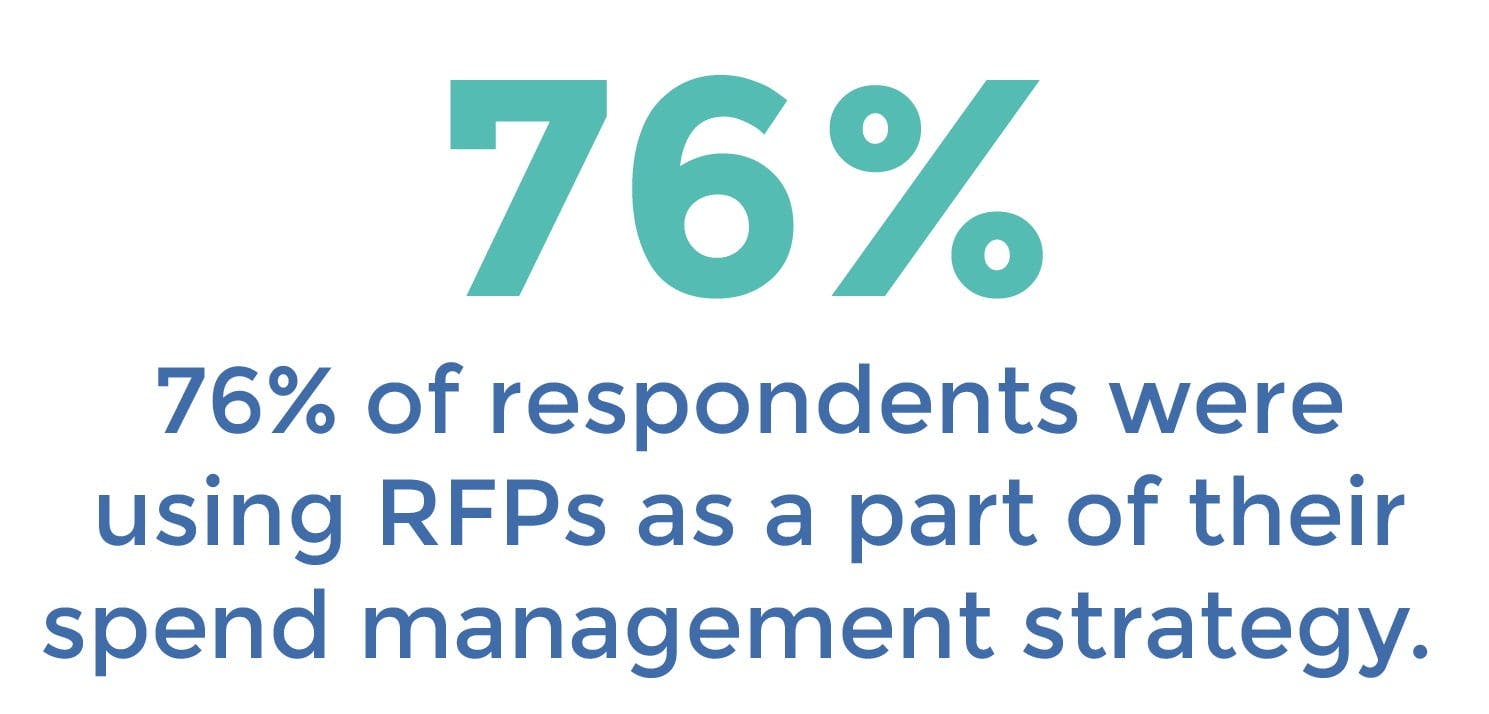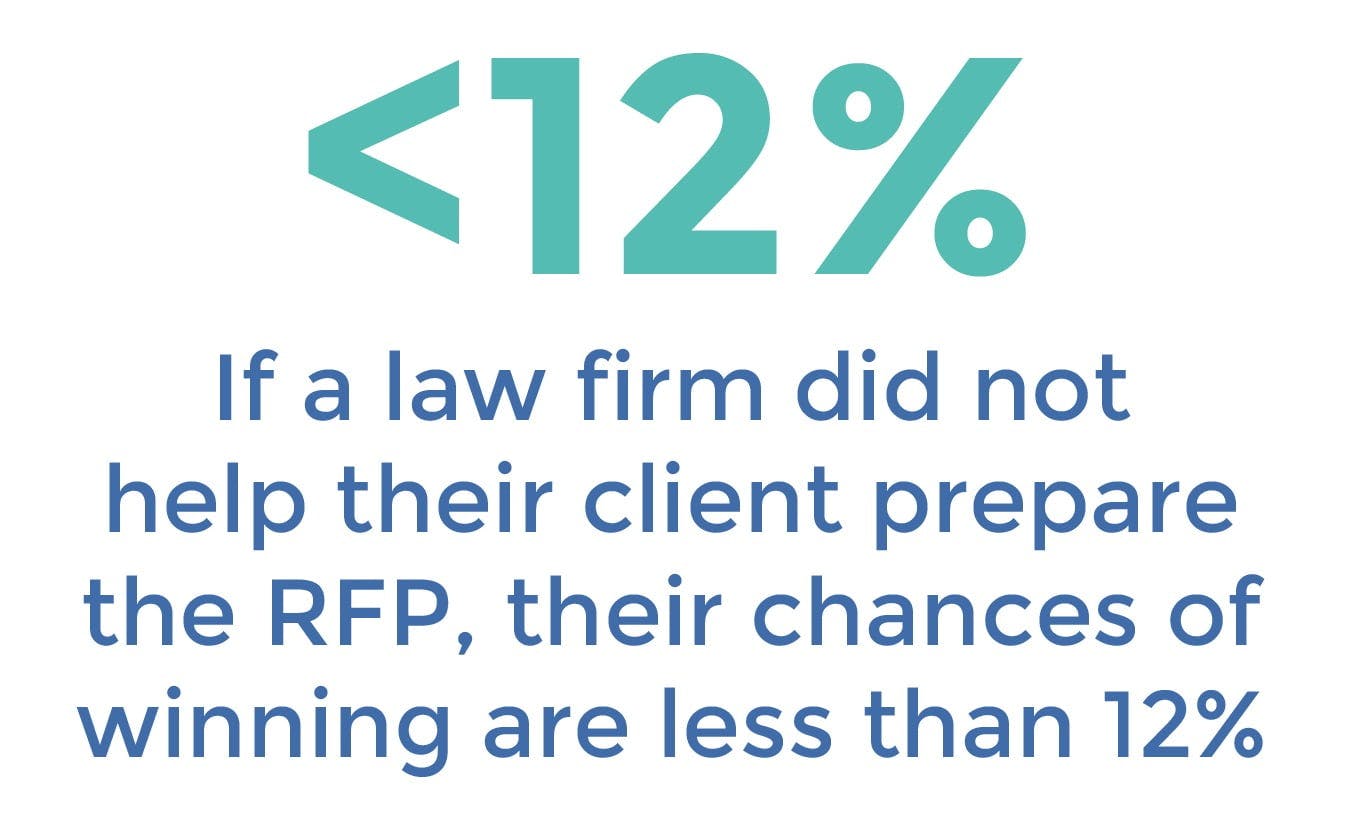There are three words that can be consistently relied upon to elicit groans, sighs and murmurs of annoyance from almost any law firm marketer or business development manager. Those three words? Law firm RFP.
This reaction isn’t surprising. Requests for proposals are everywhere. As of 2016, the average law firm receives around 200 RFPs per month. Unsurprisingly, evaluating and responding to them requires a lot of costly time and effort. But for many, the most frustrating thing of all is that RFPs can be incredibly difficult to win, no matter how qualified your firm.
Despite their lack of popularity, RFPs serve an important purpose. Corporate legal departments use RFPs in several situations, including when they need to create a panel counsel for outside legal work, need help managing a specific one-time project or require expertise in a specialty area.
Before coming to RFP360, I worked in legal technology. While in the industry, I focused on solving challenges for corporate legal teams and finding the best external counsel was always a high priority. In this post, I’ll explore law firm RFP trends, share tips for winning and offer helpful tools, including RFP software for law firms, resources from legal RFP experts and a law firm RFP example.
3 key law firm RFP trends
1. There’s been a steady increase in law firm requests for proposals
Law firms are responding to more RFPs than ever. Why? Because corporate legal teams are working to become more efficient, cost-effective and strategic. Consequently, instead of automatically pushing work to their established firms, corporate legal teams are now more likely to consider issuing an RFP. In fact, a 2018 Buying Legal Council Survey indicated that 76% of respondents were using RFPs as a part of their spend management strategy.

In addition to issuing RFPs for new engagements, corporate legal teams are increasingly taking steps to dramatically reduce their number of panel firms. When this is the case, they are often using an RFP process to determine who makes the cut.
While running an RFP for legal services is expensive and requires many resources from the business, it also allows the legal team to test the market and see if a better value is available. An article from Thomson Reuters discusses the legal RFP and reinforces this saying:
“A legal department may be driven to initiate an RFP process for a variety of reasons, including seeking greater value (as defined by the legal department) for a particular matter (or a portfolio of matters) by creating a competitive market for the work.”
This increase in RFPs is both good news and bad news for law firms. It’s good news for law firms who are looking to grow their book of business and increase market share. However, it could be bad news for incumbent firms who haven’t spent enough time developing client relationships, adding value or differentiating themselves. As Michael B. Rynowecer, President of the legal research and consulting firm, BTI, puts it:
“…The RFP is a wake-up call—a signal your client relationship is at risk because you are no longer winning work on a sole-source basis. Regardless of the motivation, the RFP is your chance (in some instances your last chance) to make a mark with clients.”
Rynowecer goes on to note that when law firms aren’t a part of writing an RFP with their client, their likelihood of winning drops below 12%. The stakes are high for both firms hoping to retain clients and those looking to establish new partnerships. So, no matter which side of the equation you’re on, running an efficient RFP process is crucial to success.

2. GCs partnering with procurement to improve sourcing
Historically, the law firm RFP process has been led by the business’s general counsel and legal team, only involving the procurement department when absolutely necessary. However, in a growing number of businesses, in-house procurement teams or external legal procurement contractors are taking a more prominent role in the legal services sourcing process. Sterling Miller, in-house lawyer and author of the Ten things you need to know as in-house counsel blog explained this shift saying:
“…more in-house departments are starting to use the RFP process – either on their own initiative or because they were “persuaded” to by senior management or other circumstances. If you do it right, the RFP process can deliver tremendous value to the legal department and the company.”
The partnership between legal and procurement is bringing general RFP best practices to the RFP for legal services. As the procurement team streamlines and standardizes the RFP process, law firms must adapt to working with them.
Law firms should take the procurement team into account and make adjustments to their approach. Proposal content that will be evaluated solely by the GC or legal team alone should be framed differently than proposal content written with both the procurement and legal team in mind.
Of course, both the procurement team and general counsel want the same thing — a successful outcome for their legal matters. However, they approach a legal service RFP with different priorities. Both will be focused on value and results, but procurement professionals will pay special attention to accurate forecasting and reliability. At the same time, general counsel will have a heavier focus on experience and the details of legal service delivery. Law firms should balance these priorities in their legal service proposals.
3. Technology is transforming the law firm RFP process
This trend should come as no surprise. The legal industry has been undergoing significant digital transformation in every area of law for nearly two decades. Legal tech is everywhere, and the number of solutions continues to grow despite increasing market consolidation. There’s an efficiency-boosting technology solution for every legal challenge, from practice management to document automation. As it turns out, there’s technology to improve law firm RFPs as well.
The legal services RFP has long been a costly undertaking. However, much of the expense of an RFP is incurred because of underlying inefficiency. If technology can reduce the amount of manual effort required using RFP automation, the returns on new business won are much greater.
Many law firms will respond to every RFP they receive while others undergo strategic go-no-go evaluations. Fortunately, there is RFP software for law firms that helps both blanket and selective responders. Emerging RFP technology is making law firm RFPs faster, more consistent and more successful. A recent post from Legaltech News discussed the topic saying:
“The good news for law firms and legal departments tired of managing their request for proposals on spreadsheets is that there’s a very real emerging marketplace for RFP software and solutions that can automate some of that process.”
Quick tips for creating winning proposals
- Ask questions and engage with the client
One of the biggest complaints law firms have about the RFP process is that the RFP itself is poorly written or vague. If you decide to respond, increase your chances of hitting all the right notes by asking for more information. Ask the RFP contact about expectations, company values and why they’re issuing an RFP rather than using a legacy firm.
- Customize your previous proposal content
RFP software for law firms can save a ton of time by centralizing past proposal content and automating your response selection, but don’t let the convenience lull you into complacency. Effective proposals express an understanding of the potential client’s unique needs. Use the time you saved by leveraging technology to customize your responses. As a guideline, try to include the client’s name twice as much as your firm’s name. When you customize, reference the specific ways that your firm’s expertise will solve their challenges.
- Understand the other side of the legal procurement process
At first glance, the procurement process appears straightforward — the business sends questions and you answer them. However, there’s a lot of steps and considerations you may miss unless you do your homework. If you learn about the procurement process, you’ll be more likely to meet all the requirements, create a connection and make it easier on the RFP issuer — which makes your firm stand out. Check out this Ten Things blog post for a quick in-house process perspective.
- Create a repeatable process
Create and follow the same RFP process every time. Just like legal project management improves legal processes, establishing a formal RFP process allows you to improve efficiency, create clarity, collect data and optimize for better outcomes. I recommend creating a RACI matrix to organize your tasks and roles while streamlining the proposal process.
- Include an RFP cover letter
After completing so many questions per RFP, sending a cover letter may seem inconsequential. However, taking the time to write an RFP cover letter communicates your genuine desire to form a beneficial partnership. It’s is a great way to make a human connection and demonstrate your understanding of the potential client’s business.
Helpful tools and resources to explore
In today’s competitive landscape, law firms need to take advantage of every tool available. Luckily, there’s a wealth of knowledge and resources available to help.
Tools to improve law firm RFPs
- Explore law firm RFP best practices
Webinar: RFPs – Best Practices & Obstacles to Avoid
– Matthew Prinn, RFP Advisory Group
- Dig deeper into the art of creating winning a law firm RFP
The Silver Bullet – How RFPS Are Won
– Nancey Watson, NL Watson Consulting
- Educate yourself on the legal procurement process
Legal procurement handbook
– Buying Legal Council
- Centralize proposal content and automate proposals
RFP software for law firms
– RFP360
- See RFP software for law firms in action
RFP technology for faster legal proposals
– RFP Advisory Group and RFP360
- Familiarize yourself with a law firm RFP templates and examples
Law firm RFP template
– Community Action Program Legal Services, Inc.
Law firm RFP example
– Office Depot RFP, seeking employment litigation legal services
- Learn from your peers
The value of building better legal proposals
The law firm request for proposal is here to stay. Firms must find ways to improve the process and use resources like RFP software for law firms to be more efficient and effective. Winning just a few more RFPs per year can result in massive benefits to a firm’s bottom line. So, spending time and resources to improve the RFP process is likely a sound investment.
